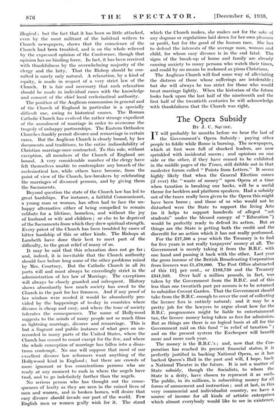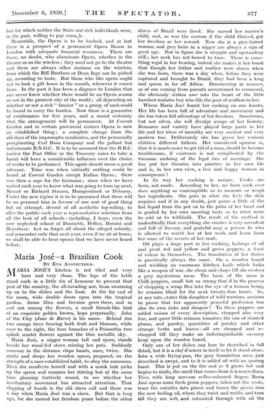The Opera Subsidy
BY J. C. SQUIRE. IT will probably be months before we hear the last of the Government's Opera Subsidy : paying other people to fiddle while Rome is burning. The newspapers, which at first were full of shocked leaders, are now sprinkled with incidental sneers ; and opinions on one side or the other, if they have ceased to be exhibited in the middle pages of the Times, still dribble out in that modester forum called " Points from Letters." It seems highly likely that when the General Election comes (if ever) the "waste of money" upon Opera at a time when taxation is breaking our backs, will be a useful theme for hecklers and platform speakers. Had a subsidy out of the taxes really been given to the Opera this might have been borne ; and those of us who would not be disturbed were the State to support the living Arts (as it helps to support hundreds of alleged "art students" under the blessed canopy of " Education ") would be perfectly ready to defend its action. But as things are the State is getting both the credit and the discredit for an action which it has not really performed.
For the £17,500 a year which the Treasury is to find for five years is not really taxpayers' money at all. The Government is merely taking it from the B.B.C. with one hand and passing it back with the other. Last year the gross income of the British Broadcasting Corporation from licences was £1,470,000. The Post Office abstracted of this 12} per cent., or £183,750 and the Treasury £341,949. Over half a million pounds, in fact, was taken by the Government from the B.B.C. and of this less than one twentieth part per annum is to be returned to subsidize Covent Garden. That the Government should take from the B.B.C. enough to cover the cost of collecting the licence fees is entirely natural; and it may be a pretty job for the lawyers to argue about how far the B.B.C. programmes might be liable to entertainment tax, the licence money being taken as fees for admission But as things are there is no logical basis at all for the Government raid on this fund " in relief of taxation " ; and on the present system the Exchequer will benefit more and more each year.
The money is the B.B.C.'s ; and, now that the Cor-
poration has reached its present financial status, it is perfectly justified in backing National Opera, as it has backed Queen's Hall in the past and will, I hope, back a National Theatre in the future. It is not a matter of State subsidy, though the Socialists, to whom the State is a deity, have chosen to represent it as such. The public, in its millions, is subscribing money for all forms of amusement and instruction ; and at last, in this very commercial and individualist country, we have a source of income for all kinds of artistic enterprises which almost everybody would like to see in existence, but for which neither the State nor rich individuals were, in the past, willing to pay enoubh.
Meanwhile, the Opera is to be backed, and at last there is a prospect of a permanent Opera House in London with adequate financial resources. There are those, no doubt, who abominate Opera, whether in the theatre or on the wireless ; they need not go to the theatre and there are always other stations on the wireless, from which the Biff Brothers or Dean Inge can be picked up, according to taste. But those who like opera ought not to look a gift horse in the mouth, wherever it comes from. In the past it has been a disgrace to London that OM never knew whether there would be an Opera season or not in the greatest city of the world ; all depending on whether or not a rich " fancier " or a group of such could be found to carry the burden. Now there is a guarantee of continuance for five years, and a moral certainty that the arrangement will be permanent. At Covent Garden and in certain provincial centres Opera is now an established thing ; a complete change from the old days of the impromptu syndicates, and the perennially peregrinating Carl Rosa Company and the gallant but unfortunate B.N.O.C. It is to be assumed that the B.B.C. (unless the Post Office or the Treasury cares to take a hand) will have a considerable influence over the choice of works to be performed. This again should mean a great advance. Time was when virtually nothing could be heard at Covent Garden except Italian Opera ; there was then a rage for the Germans ; since when we have waited each year to know what was going to turn up next, Mozart or Richard Strauss, Humperdinck or Debussy. Under the new regime it is to be presumed that there will be no personal bias in favour of one sort of good thing but an attempt, devoid of all aesthetic log-rolling, to offer the public each year a representative selection from all the best of all schools—including, I hope, even the now neglected school of Donizetti, Bellini, Rossini and Meyerbeer. Let us forget all about the alleged subsidy, and remember only that next year, even if we sit at home, we shall be able to hear operas that we have never heard before.



























































 Previous page
Previous page